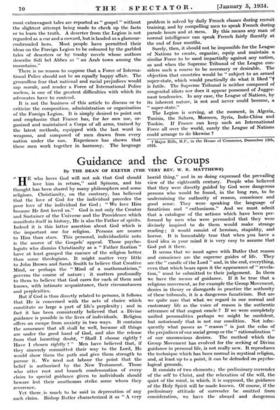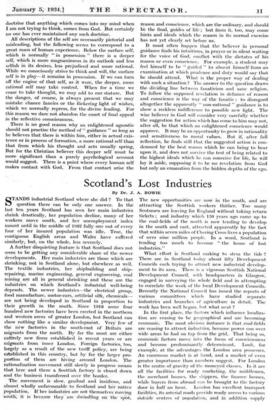Guidance and the Groups
By THE DEAN OF EXETER (THE VERY REV. W. R. MATTHEWS)
" UE who loves God will not ask that God should 1.11. love him in return," said Spinoza, and his thought has been shared by many philosophers and some religions. Christianity, on the contrary, has believed that the love of God for the individual precedes the poor love of the individual for God ; "We love Him because He first loved us." God is not only the Creator and Sustainer of the Universe and the Providence which manifests itself in history, He is also the Father of spirits.
Indeed it is this latter assertion about God which is the important one for religion. Persons are nearer to Him than stars. This personal, individualistic note is the source of the Gospels' appeal. Those psycho- logists who dismiss Christianity as a "Father fixation" have at least grasped the essence of the religion better.
than some theologians. It might matter very little to John Brown and Sarah Smith to believe that Creative Mind, or perhaps the "Mind of a mathematician," governs the course of nature ; it matters profoundly to them to believe that God cares for each of them and knows, with intimate acquaintance, their circumstances and perplexities.
But if God is thus directly related to persons, it follows that He is concerned with the acts of choice which constitute so large a part of life's perplexity ; and in fact it has been consistently believed that a . Divine guidance is possible in the lives of individuals. Religion offers an escape from anxiety in two ways. It contains the assurance that all shall be well, because all things are under the good hand of God, and also the release from that haunting doubt, "Shall I choose rightly ? Have I chosen rightly?" Men have believed that, if they sincerely committed their way to the Lord, He would show them the path and give them strength to pursue it. We need not labour the point that the belief is authorized by the New Testament. Those who utter root and branch condemnation of every claim to special guidance given to individuals should beware lest their anathemas strike some whom they reverence.
Yet there is much to be said in deprecation of any such claim. Bishop Butler characterized it as "A very horrid thing," and in so doing expressed the prevailing view of the eighteenth century. People who believed that they were directly guided by God were dangerous persons who would be found, in the long run, to be undermining the authority of reason, conscience and good sense. They were speaking the language of fanaticism and "enthusiasm." And, we must admit that a catalogue of the actions which have been per- formed by men who were persuaded that they were divinely inspired to do them would make strange reading ; it would consist of heroism, stupidity, and horror. It is lamentably. true that when you have a fixed idea in your mind it is very easy to assume that God put it there.
It seems that we must agree with Butler that reason and conscience are the supreme guides of life. They are the" candle of the Lord "and, in the end, everything, even that which bears upon it the appearance of" revela- tion," must be submitted to their judgement. In them we have the means of guidance. If it be true that a religious movement, as for example the Group Movement, denies in theory or disregards in practice the authority of these tribunals, it is a dangerous fanaticism. But are we quite sure that what. we regard in our normal and. customary life as the voice of reason is the authentic utterance of that august oracle ? If we were completely unified personalities perhaps we might be confident, but notoriously that is not our condition. Not infre- quently what passes as " reason " is just the echo of the prejudices of our social group or the" rationalization" of our unconscious desires. The method which the Group Movement has evolved for the seeking of Divine guidance in personal life, is not really new. It reproduces the technique which has been normal in mystical religion, and, at least up to a point, it can be defended: on psycho- logical grounds.
It consists of two elements ; the preliminary surrender of the self to Christ, and the relaxation of the will, the quiet of the mind, in which, it is supposed, the.guidance of the Holy Spirit will be made known. Of course, if the preliminary attitude of surrender be omitted from consideration,, we have the ' absurd and dangerous doctrine that anything which conies into my mind -when I am not trying to think, comes from God. But certainly no one has ever maintained any such doctrine.
All descriptions of the self are necessarily pictorial and misleading, but the following seems to correspond to a great mass of human experience. Below the surface self, which is normally "in possession" there is a deeper self, which is more magnanimous in its outlook and less selfish in its desires, less prejudiced and more rational. While we consciously strive to think and will, the surface self is in play—it remains in possession. If we can turn off the engine of that self, as it were, the deeper, more rational self may take control. When for a time we cease to take thought, we may add to our stature. But the danger, of course, is always present that we may mistake chance fancies or the flickering light of wishes, which we normally repress, for the divine leading. For this reason we dare not abandon the court of final appeal in the reflective consciousness.
There is no good reason why an enlightened agnostic should not practise the method of" guidance" so long as he believes that there is within him, either in actual exis- tence or in process of formation, a more rational self than that from which his thought and acts usually spring. But for the Christian believer this deeper self must be more significant than a purely psychological account would suggest. There is a point where every human self makes contact with God. From that contact arise the reason and conscience, which are the ordinary, and should lie the final, guides of life;' but from it, too, may come hints and ideals which the reason in its normal exercise has not yet clearly set before Us.
It must Often happen that the believer in personal guidance finds his intuitions, in prayer or in silent waiting for the voice of God, conflict with the dictates of his reason oreven conscience. For example, a student may feel himself to be " guided " to absent himself from an examination at which prudence and duty would say that he should attend. What is the proper way of dealing with such a situation ? The answer to the question draws the dividing line between fanaticism and sane religion. To follow the supposed revelation in defiance of reason and conscience is the way of the fanatic : to disregard altogether the apparently " non-rational" guidance is to show a reckless indifference to possible new light. The wise believer in God will consider very carefully whether the suggestion for action which has come to him may not, after all, be that which an enlightened conscience would approve. It may be an opportunity to grow in rationality and sensitiveness to moral values. But if, after full reflection, he finds still that the suggested action is con- demned by the best reason which he can bring to bear upon it, and does not survive the test of being related to the highest ideals which be can conceive for life, he will lay it aside, supposing it to be no revelation from God but only an emanation from the hidden depths of the ego.







































 Previous page
Previous page